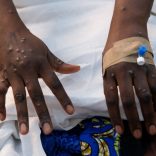Mozambique: Security situation in north 'continues to deteriorate' - UNHCR
Keeping girls in secondary school reduces HIV infection – Anne Githuku-Shongwe in Mozambique

Photo: Twitter / @anneshongwe
The UNAIDS Director for Eastern and Southern Africa, Anne Githuku-Shongwe, believes that keeping girls in secondary school reduces the probability of HIV infection by 50 per cent, and decreases child marriage in sub-Saharan Africa, including Mozambique.
The data advanced by Anne Githuku-Shongwe follows the United Nations initiative called Education Plus, 2021-2025, launched in Zambia in mid-July last year on the margins of the African Union’s 2022 biannual summit.
“In addition to empowering adolescent girls and young women and achieving gender equality in sub-Saharan Africa, the initiative also aims to accelerate HIV prevention among adolescent girls and young women, and other multiple social and economic benefits that countries can achieve by heeding the call for political action and leadership”, said the director.
Githuku-Shongwe, who was speaking on Monday to the press after an audience granted by Mozambican Foreign Minister Verónica Macamo, in Maputo, explained that “Education Plus is a program in which we intend that girls stay until the end of secondary school, because data shows that girls who study until they finish that level reduce the possibility of being infected by HIV by 50 per cent.”
The director praised the fact that Mozambique has joined the Global Alliance against Pediatric HIV/AIDS, stressing that on the African continent the vertical transmission of HIV has not yet stopped, so girls get pregnant and do not even seek early health care, ending up approaching health facilities quite late.
“As a result, they end up infecting their babies. For that reason, we are concerned about the situation and we want girls to have enough information”, she said.
United Nations Agencies, including UNAIDS, released earlier this month the list of 10 countries in the inaugural phase of the Global Alliance against Pediatric HIV-AIDS, and Mozambique is in the initial stage of the initiative that should promote access to treatment by 2030.
An estimated 52 percent of HIV-positive children have been receiving antiretroviral treatment, as opposed to 76 percent in adults.
For her part, Veronica Macamo expressed her concern about keeping girls in schools, as well as reducing the rates of child marriage, which is in line with the goals of UNAIDS.
“UNAIDS’ concern comes as a result of the release of its report two weeks ago, which addresses the progress made in the fight against HIV. We raise some concerns about the fact that we still have new infections in this region of sub-Saharan Africa, especially in girls and adolescents and young women”, the minister said.
Inspired to meet Minister Macamo Dlhovu #Mozambique Minister Foreign Affairs & Cooperation. She shared her passionate commitment to ending early ‘marriages’ of girls across the countey pic.twitter.com/op0ciDj5iY
— agshongwe (@anneshongwe) August 16, 2022












Leave a Reply
Be the First to Comment!
You must be logged in to post a comment.
You must be logged in to post a comment.